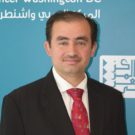Speakers
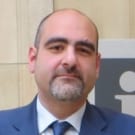
Assaad Al Achi
Syrian Civil Society Activist; Executive Director, Baytna Syria
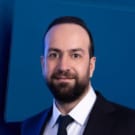
Hamzah Almustafa
Director Syria Television; PhD Candidate and Researcher in Middle Eastern Politics, University of Exeter
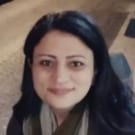
Dima Moussa
Syrian-American Lawyer; Member of the Syrian Constitutional Committee, Syrian National Coalition, and Syrian Women’s Political Movement
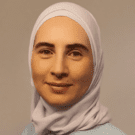
Yasmine Nahlawi
Legal Consultant; PhD, International Law
Moderator
Event Summary
On April 20, 2021, Arab Center Washington DC (ACW) held a webinar titled “The Way Forward in Syria: The Political Process, Transitional Justice, and US Policy.” Panelists were Assaad Al Achi, a Syrian civil society activist and Executive Director of Baytna Syria; Hamzah Almustafa, Director of the Istanbul-based Syria Television; Dima Moussa, Syrian-American lawyer and member of the Syrian Constitutional Committee, Syrian National Coalition, and Syrian Women’s Political Movement; and Yasmine Nahlawi, an international legal consultant. ACW Senior Fellow Radwan Ziadeh moderated the event.
Dima Moussa reminded the audience that Syria and the Syrian people are slowly becoming less of a priority to the international community, and this is an incentive for Syrians to be more involved in resolving their own crisis. She said that the situation calls on Syrians to “work and intensify the work at all levels, political, civil, legal, humanitarian, even at the media level and advocacy.” Moussa stated that the Syrian crisis is becoming more complex and complicated and needs a political solution based on adopting and implementing United Nations Security Council resolution 2254. The solution must also establish the mechanism for a transition to a non-sectarian political system protected by a constitution and laws that respect the rights of Syrians. Moussa relayed that work on the Syrian Constitutional Committee, which has held at least five meetings, failed because there was no regime partner. Instead, the regime focused on side issues and procedures without dealing with the central dilemma of the crisis: a transition from authoritarian rule. Moussa also criticized the international community’s lack of concern for such a transition. She stated that progress has almost become limited to how the United States and Russia deal with each other in helping to resolve the crisis, in essence ignoring the serious local impediments for change in the country. Moussa also decried the spread of militias and warlords who have become the main beneficiaries of the continuing conflict. She called for more involvement by the United States before a de facto partition takes place, characterizing as dangerous the statement of US envoy James Jeffrey that stalemate in Syria means stability. Finally, Moussa called for more inclusion of women in opposition circles, considering their currently limited presence as detrimental to the cause of change in Syria.
Hamzah Almustafa concentrated on economic conditions on the ground in Syria’s different regions, competition between regime elites, and the differing considerations between Russia and Iran in the country. He stated that Syria today constitutes five regions: Idlib, the Turkish areas on the border, the Kurdish-controlled northeast, Islamic State enclaves, and regime areas. He said that different economic conditions exist there with some regions faring better than others; but all risk complete collapse. Importantly, Almustafa highlighted the crisis in regime areas where sanctions are biting and where competition between elites is manifested in both the establishment of economic centers of power and the provision of weapons to militias to protect economic interests. This situation has replaced the old Syrian model of established business leaders who had always supported the Assad regime. Another area of competition that is affecting the conflict now is between Russia and Iran, Almustafa explained, with the latter seeming to gain the upper hand. He argued that “Russia after five years of its involvement in Syria has failed to balance the Iranian presence.” In addition, he asserted that while Russia can affect the regime politically, Iran is the one that is working on the ground to increase its influence. He ended his remarks by saying that Russia may not be ready to offer or force a political solution to the Syrian crisis.
Assessing international intervention according to the principles of Responsibility to Protect (R2P), Yasmine Nahlawi said that the international community has not followed through on R2P stipulations that codify a moral obligation to intervene against a state if it does not protect its citizens or if it actually commits crimes against them. Nahlawi said that the Syria situation has taught the international community three important lessons. The first is that the veto power enjoyed by the five permanent members of the UN Security Council should be curbed; indeed, Russia and China protected the Syrian regime by exercising that veto more than 16 times. Further, whatever was passed regarding Syria in the Security Council was watered down and lost impact. The second is the realization that the General Assembly does have power to recommend action against a criminal state or force certain procedures to be implemented, highlighting the fact that “there is nothing prohibiting the General Assembly from recommending the use of force … The General Assembly has the competency to recommend measures up to and including the use of force.” The third lesson according to Nahlawi is that there is a need to center international responsibility on the issue of protection. Syria has had serious problems with weapons of mass destruction, terrorism, and involvement of outside actors like Hezbollah. Syrian refugees have been forced to scatter around the world to flee violence against them. In essence, Nahlawi concluded, what was and remains missing in the Syrian case is the absence of international responsibility to protect people against the abhorrent practices of the Syrian regime.
Looking into the role of civil society in the Syrian conflict, Assaad Al Achi said that this sector is probably the most prepared to have an impact on the ground, both inside and outside Syria. Civil society groups respond to humanitarian crises, advocate for different causes, and develop organizational capacities for communities. They bring a perspective to their work that is different from the old model of Syrian charities, whose role diminished as the Baath Party came to power and especially during the Hafez al-Assad presidency. Al Achi said that there was an expansion of civil society work given the intensification of the conflict; however, civil society groups are not at all free to carry out their missions in any area of the country, with the opposition or with the regime. He also stated that one of the problems that these groups face is the gap between what is pledged by international actors for their work and what is actually delivered, emphasizing the fact that only some 33 percent of money that makes its way to Syria ends up covering aid activities, while the rest goes to overhead. Al Achi highlighted an important aspect of civil society work which involves bridging organizations and their work, saying that groups have been “investing a lot of bridging in the different areas and trying to make sure that the messaging is moving among them.” They can cooperate with each other on humanitarian issues, but they have to be careful not to get each other in trouble with the particular authority that controls their geographic area of work. Civil society organizations also have to be careful about getting involved in politics, he added, especially at this point of high donor fatigue.

